 |
|---|
|
The prime minister of Aruba is de facto head of the executive branch of government. Together with Aruba's Council of Ministers, they form the executive branch of Aruban government.
 |
|---|
|
The prime minister of Aruba is de facto head of the executive branch of government. Together with Aruba's Council of Ministers, they form the executive branch of Aruban government.
| No. | Portrait | Name (Birth–Death) | Term of office | Party | ||
|---|---|---|---|---|---|---|
| 1 | 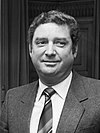 | Henny Eman (born 1948) | 1 January 1986 | 9 February 1989 | AVP | |
| 2 |  | Nelson Oduber (born 1947) | 9 February 1989 | 1 September 1994 | MEP | |
| (1) |  | Henny Eman (born 1948) | 1 September 1994 | 30 October 2001 | AVP | |
| (2) |  | Nelson Oduber (born 1947) | 30 October 2001 | 30 October 2009 | MEP | |
| 3 | 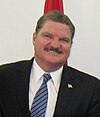 | Mike Eman (born 1961) | 30 October 2009 | 17 November 2017 | AVP | |
| 4 |  | Evelyn Wever-Croes (born 1966) | 17 November 2017 | Incumbent | MEP | |
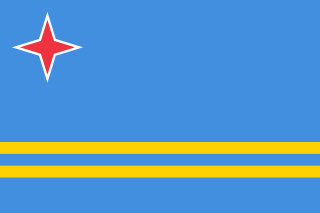
Aruba, officially the Country of Aruba, is a constituent country within the Kingdom of the Netherlands, situated in the south of the Caribbean Sea. Aruba is located approximately 29 kilometres (18 mi) north of the Venezuelan peninsula of Paraguaná and 80 kilometres (50 mi) northwest of Curaçao.
The executive, also referred to as the executive branch or executive power, is the term commonly used to describe that part of government which executes the law.
Separation of powers is the division of a state's government into branches, each with separate, independent powers and responsibilities, so that the powers of one branch are not in conflict with others. The typical division into three branches of government, sometimes called the trias politica model, includes a legislature, an executive, and a judiciary. It can be contrasted with the fusion of powers in monarchies, but also parliamentary and semi-presidential systems where there can be overlap in membership and functions between different branches, especially the executive and legislative.
The politics of the Netherlands Antilles, a former constituent country of the Kingdom of the Netherlands, existed in a framework of a parliamentary representative democratic country, in which the prime minister was the head of government, and of a multi-party system. Executive power was exercised by the government. Federal legislative power was vested in both the government and parliament. The Judiciary was independent of the executive and the legislature. The Netherlands Antilles had full autonomy on most matters. Exceptions were defence, foreign affairs, and the Supreme Court.

Politics of Aruba, a constituent country of the Kingdom of the Netherlands, takes place in a framework of a parliamentary representative democratic country, whereby the governor in his capacity as the King's representative is the de jure head of government and of a multi-party system. Executive power is exercised by the government. Federal legislative power is vested in both the government and the Parliament. The Judiciary is independent of the executive and the legislature. Aruba has full autonomy on most matters. Exceptions are defense, foreign affairs, and the Supreme Court. The constitution was enacted in 1986.
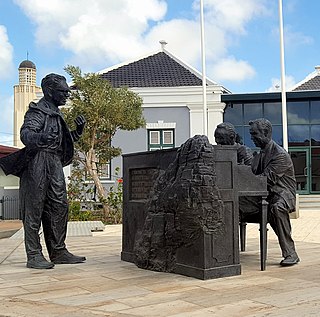
"Aruba Dushi Tera" is the national anthem of Aruba. It is a waltz written by Juan Chabaya Lampe and composed by Rufo Wever. The last verse was written by Hubert (Lio) Booi. It was accepted as the Aruban national anthem on 18 March 1976. It is written in Papiamento.

The prime minister of the Netherlands is the head of the executive branch of the Government of the Netherlands. Although the monarch is the de jure head of government, the prime minister de facto occupies this role as the officeholder chairs the Council of Ministers and coordinates its policy with the rest of the cabinet. In his role as head of government, the prime minister also represents the Netherlands in the European Council. The current acting prime minister, Mark Rutte, has been in the position since 14 October 2010, with his fourth cabinet being inaugurated on 10 January 2022. He resigned his position on 7 July 2023 and until a new prime minister is sworn in after the 2023 Dutch general election, he will serve in a demissionary capacity.

The following is an alphabetical list of topics related to the nation of Aruba.
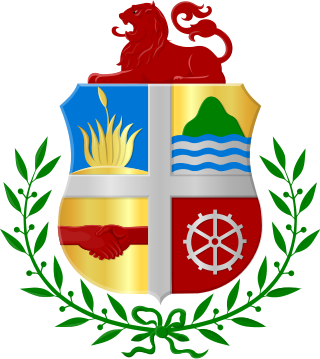
The Coat of arms of Aruba has been officially in use since November 15, 1955, as the recognized national symbol of Aruba.

Aruba's Constitution was unanimously approved by all political parties represented in Aruba's Parliament on a January 1, 1986, and was proclaimed in the Afkondigingsblad van Aruba, No.26, 1985, on January 1, 1986.

The People's Electoral Movement is a social democratic political party in Aruba. Following the 2001 general election for the Parliament of Aruba the party won 52.4% of popular vote and 12 out of 21 seats. In the 2005 general election, the party won 43% of the popular vote and 11 out of 21 seats thus won the election and remained in power. In the 2009 general election, MEP lost 2 seats and won 36% of the vote, subsequently losing the election.
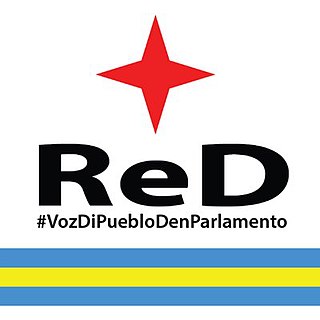
Democratic Network is a progressive, green political party in Aruba. Since the 2017 Aruban general election it has one seat in the Estates of Aruba and is part of the government coalition under Prime Minister Evelyn Wever-Croes.
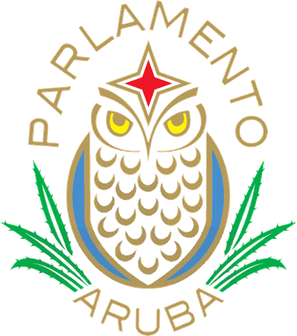
The Parliament of Aruba is the unicameral legislature or parliament of Aruba. The parliament has 21 members, elected for a four-year term by proportional representation. Each member holds their seats until the parliament is dissolved, which is every four years by a general election. The leader of the party which gains a majority of seats usually becomes the Prime Minister.
The term administration, as used in the context of government, differs according to the jurisdiction under which it operates. In general terms, administration can be described as a decision-making body.
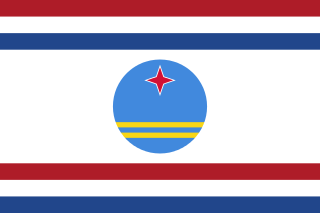
The governor of Aruba is the representative on Aruba of the Dutch monarch. The governor's duties are twofold; he represents and guards the general interests of the Kingdom of the Netherlands and is head of the Aruban government. He is accountable to the government of the kingdom. As the head of the Aruban government, the governor is inviolable; the ministers are responsible. The governor does not have political responsibilities and is not part of the Aruban cabinet. During the formation of a cabinet, the governor plays an important role. The governor is appointed by the monarch for a period of six years. This period can be prolonged for one more term of six years. The governor is supported and advised by the Council of Advice, consisting of at least five members, appointed by the governor, advising him on the drafts of state ordinances, state decrees, kingdom acts and general administrative orders.

The Council of Ministers of the Kingdom is the executive council of the Kingdom of the Netherlands, which is a state consisting of four constituent countries: Aruba, Curaçao, the Netherlands, and Sint Maarten.

The Minister Plenipotentiary of Aruba represents the constituent country of Aruba in the Council of Ministers of the Kingdom of the Netherlands. The current Minister Plenipotentiary of Aruba is Guillfred Besaril. The Minister Plenipotentiary and his cabinet are seated in the Arubahuis in The Hague.

The Government of Malta is the executive branch of the Republic of Malta. It is made up of the Cabinet and the Parliamentary Secretaries. The Prime Minister is appointed by the President of Malta, with the President making their decision based on the situation within the Maltese parliament. The Prime Minister is responsible for assigning departments of government to Permanent Secretaries. The President of Malta also appoints the rest of the cabinet with the assent of the Prime Minister of Malta.

The Kingdom of the Netherlands, commonly known simply as the Netherlands, is a sovereign state consisting of a collection of constituent territories united under the monarch of the Netherlands, who functions as head of state. The realm is not a federation; it is a unitary monarchy with its largest subdivision, the eponymous Netherlands, predominantly located in Northwestern Europe and with several smaller island territories located in the Caribbean.
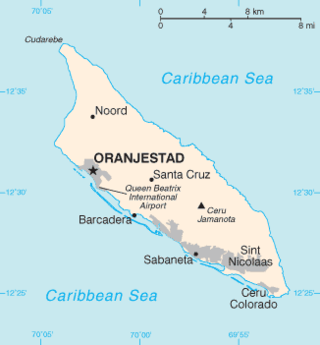
The COVID-19 pandemic in Aruba was a part of the ongoing global viral pandemic of coronavirus disease 2019 (COVID-19), which was documented for the first time in Aruba on 13 March 2020. As of 29 May, all cases recovered. On 29 June, two new cases were discovered.